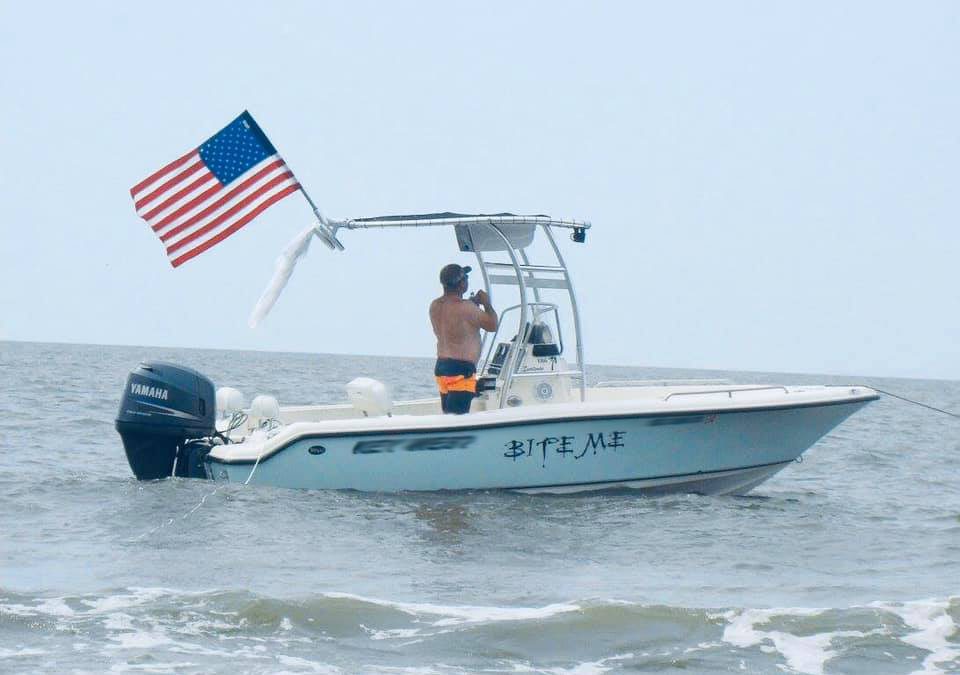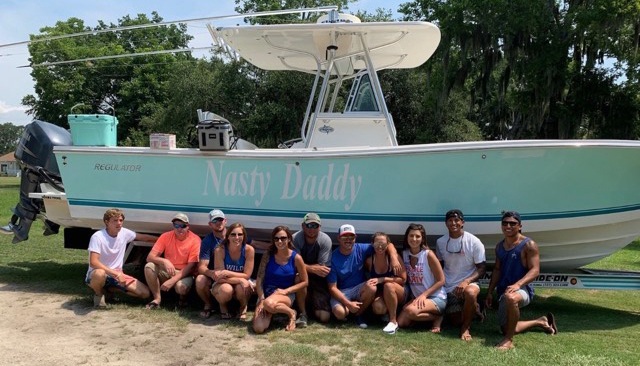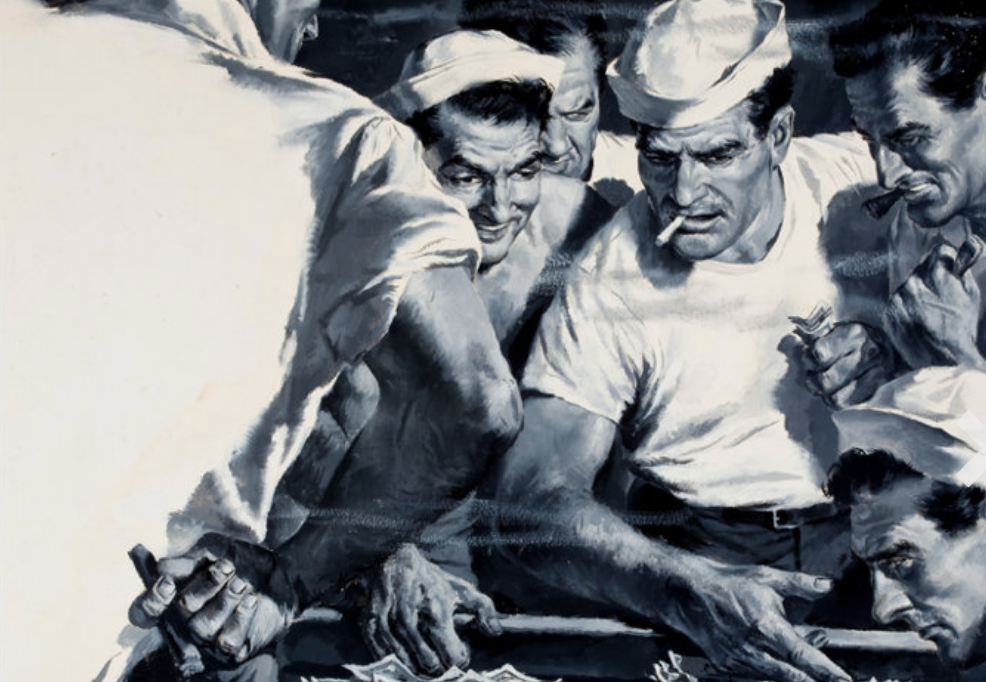When it comes to naming your boat, no one has the right to tell you what to emblazon on the stern. But trust me; from one Captain to another, there are a few names that you might want to avoid.
Creating boat names is as tricky as naming a child. Name it after a real person, and odds are you will make some overlooked family member angry or jealous; and you might as well pick a pretty-sounding name because you are going to be screaming it over and over when someone borrows her and that rambunctious boat stays out past 2 a.m., making you worry all night that she might be wrecked and lying in a ditch somewhere.
I happen to know a little something about boat naming. I am the proud daddy of two boats of my own, a precious little kayak that was brought into this world early Christmas morning with a cute little red ribbon tied to her bow right above that adorable factory-made dimple, and her recently adopted, much-older sibling, an elegant fiberglass and cypress canoe. In fact, you can call me Captain, if you insist. Sit back and let Captain Mike give you some excellent advice on naming your own little bundle of boat joy.

What’s in a Name?
The first question you may have is, “Does this lunatic paint his boats with lead paint?” The second question may be, “Why bother naming a boat at all?”
The practice of boat naming originated in ancient times, when sailors named vessels after gods, goddesses or saints in hopes of good fortune, good fishing and safe travels. Those names were believed to be recorded by Poseidon (the Greek god of the sea) in the Ledger of the Deep, which was his personal record book. Nowadays, boats are recorded in a different ledger, one faithfully kept by the IRS, as well as the state and county tax collectors. You can count on that. That’s why some modern sailors like to name their boats after winning lottery tickets, profitable Fortune 500 companies, etc. Somehow I don’t think Poseidon would approve of all that, but as long as the IRS is happy, everyone is happy.
When it comes to naming your boat, no one has the right to tell you what to emblazon on the stern. It’s your baby, you paid for it (or are probably still working two jobs to pay for it), and you keep her well-fed with high-octane marine fuel. But trust me; from one Captain to another, there are a few names that you might want to avoid.
 Boat Names to Avoid
Boat Names to Avoid
There are a few names that the gods likely wouldn’t approve of, frankly, because they have become so popular that they are almost a floating cliché. For example: Seas The Day, Carpe Diem, Dream Weaver, Wind Catcher, Osprey, Pegasus, Serenity and Serendipity, which BoatUS says have been among the most popular vessel names for decades. Come one, folks, you can do better than that.
With the popularity of The Pirates of the Caribbean movie franchise, there are a lot of ships named Pearl floating around out there right now. Thanks a lot, Captain Jack Sparrow.
Gentlemen, kindly avoid vulgar names if you can help yourself. Imagine this: you are out on your boat, M. Baiter, and you ride up on your Baptist preacher who is fishing with all the deacons. Yeah, that could be awkward.
Some boat names are so pompous and cocky that the owner must be begging for trouble on the high seas: Aquaholic (obviously more than just a social boater), Second Wind (obviously a sail boat), Blew By You (obviously a speed boat), Liquid Asset, Miss Behavin’ and Nauti Buoy.
Here are some corny boat names that should be scuttled to the bottom of the sea: Fishizzle, The Codfather, Hoosier Daddy, 3 Sheets, Gas Money, My Ex-Wife Got the Mansion, Grandkid’s Inheritance, Why Knot and High Maintenance.
Imagine that you are a Coast Guard captain, and you hear on the radio that a boat with one of those disastrous names is in distress.
 Naming Boats After Real People
Naming Boats After Real People
When it comes to boat naming, I find nothing is classier and more timeless and traditional than using a beloved female name for a vessel, especially since it is maritime tradition that every boat be considered a “she.” However, in today’s politically correct world that may be a touchy subject, so I won’t attempt to assume your boat’s gender.
As a gentleman and a romantic, I named my first boat after an important female in my life, which is why I gave the kayak my wife’s nickname, Little Miss Sparky. It only seemed fitting considering all the begging, crying and dish washing I had to do to convince Old Sparky to buy it for me.
However, when it comes to lady names there are a few safety rules:
- If you are happily married, it’s never a good idea to name a boat after your ex-wife, an ex-girlfriend or your favorite sexy movie star, unless you enjoy repeated paddle blows to the head or you have a secret longing to be buried at sea.
- If you name a boat after the beloved family dog, Dixie Girl, you will have to be very specific when you talk about “covering Dixie up” and “putting her away for the winter” in front of the kids.
- To avoid any mother-in-law/daughter-in-law drama, never name a boat after your mother unless you have already named a boat after your wife. That’s just common sense, man. Otherwise, the original Mrs. Sparky might get jealous and you will have to spend the night in your new boat, Granny Wanda, with nothing but a sail to keep you warm.
- To keep confusion down, I suggest that you simply name your boat Love of My Life, and then you can privately tell both your wife and your Mom that you were thinking about them. No one needs to know that you really named it after that cheerleader you had a crush on back in high school.
While we are on the subject of naming, perhaps it may have been a little pompous and arrogant for me to insist you call me Captain. After all, I do own two boats now, and that should be considered a fleet. So how about Admiral?
 Follow Ernest Hemingway’s exploits on the Bahamian island of Bimini from 1935 to 1937, the very moment in time when the International Game Fish Association (under the author’s co-leadership) was emerging. Covers Hemingway’s role in the formation of the IGFA, his under-appreciated seminal writing about competitive saltwater angling when the sport was still in its infancy, the amazing fishing he enjoyed on the island, and the way all of these experiences translated into the composition of his posthumous novel Islands in the Stream. Buy Now
Follow Ernest Hemingway’s exploits on the Bahamian island of Bimini from 1935 to 1937, the very moment in time when the International Game Fish Association (under the author’s co-leadership) was emerging. Covers Hemingway’s role in the formation of the IGFA, his under-appreciated seminal writing about competitive saltwater angling when the sport was still in its infancy, the amazing fishing he enjoyed on the island, and the way all of these experiences translated into the composition of his posthumous novel Islands in the Stream. Buy Now

 Boat Names to Avoid
Boat Names to Avoid Naming Boats After Real People
Naming Boats After Real People

